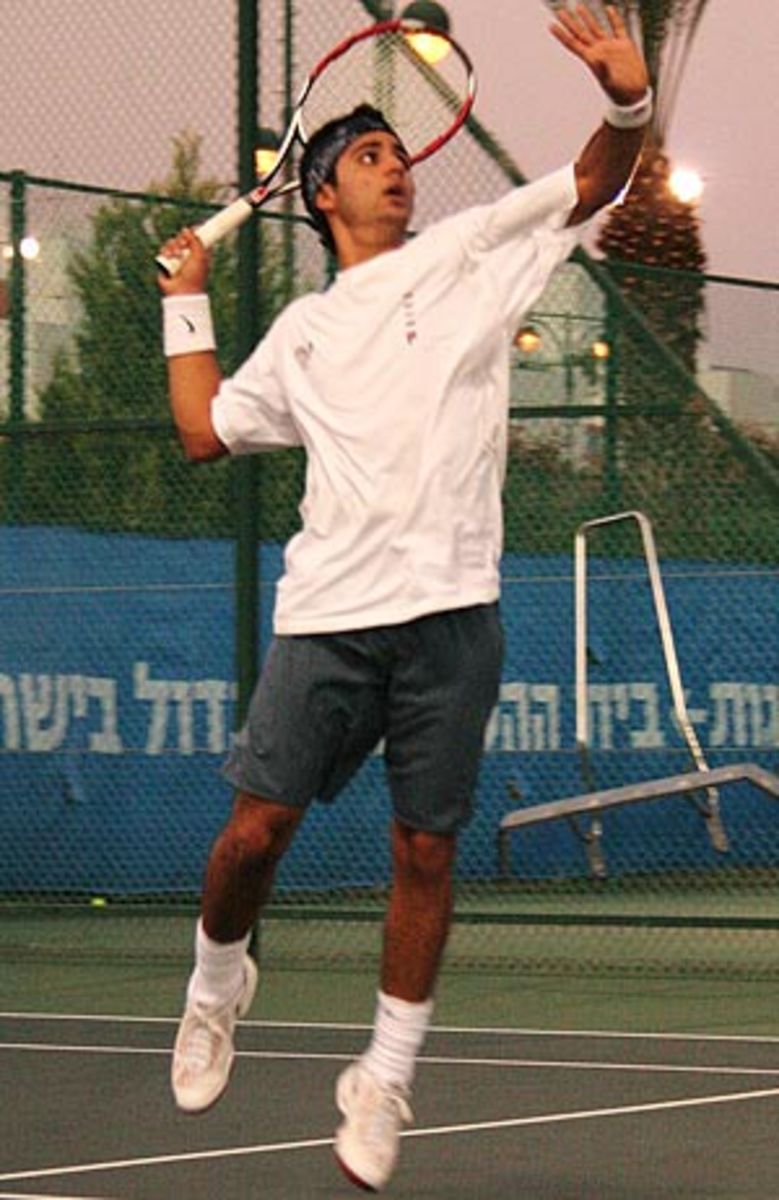
Fahoum family using fame to fight intolerance in the Middle East
HAIFA, ISRAEL -- During Israel's 60th anniversary celebration last May, 12 torches were lit by members of the old and new generations representing Israel. Standing among them was 17-year-old Fahoum Fahoum, a Palestinian Arab, lighting one of the torches emblematic of the 12 Tribes of Israel in front of his peers. For Israelis, this would have been considered a major honor, but for the Fahoum family, it wasn't so simple.
For the last five years, Fahoum and his sister, Nadine, have been two of Israel's top-ranked tennis players. At 14, Fahoum was seeded as high as No. 1. Last season, Nadine, who was Israel's top player a few years prior, was the Colonial Athletic Association's co-rookie of the year at Old Dominion in Virginia.
Rather than just enjoy the sport that has raised their profile in the Palestinian and Haifa communities, the first family of Arab tennis has used it as a platform to push for tolerance and acceptance in a land in which tensions often make such phrases afterthoughts.
When Fahoum was seven and Nadine was nine, both were detained while leaving for junior tournaments abroad. Although they were wearing the same garb as their Jewish and Israeli teammates, both faced longer delays and extra questioning that their mother, Wafa Zoubi-Fahoum, deemed ridiculous. "They were questioned differently and they were all children," the mother says. "They have an Israeli passport."
Wafa, who has earned her community's respect as a human rights lawyer and public servant, caused such a stir that former President Shimon Peres spoke with her personally. Soon after, she was called upon to lecture transportation and customs employees on tolerance. She still does this regularly for El Al employees, and occasionally her son goes with her.
"I tell them about my experiences," he says. "When I was taken away from my team and being questioned differently, it is a very insulting and bothering thing."
Nadine endured a similar situation when she was 15 and going to Italy with the Israeli Olympic Junior team. "It took five guys to check my passport," she says. "Then they ask where I am coming from and what are the names of my parents and asked me about what school I go to."
As Fahoum got older, he realized it helped if he spoke up. In 2007, he was part of the second delegation for a new conflict resolution group in Los Angeles called Project Triumph, which brings Jewish and Palestinian Arabs together from his home city of Haifa. There, leadership skills are taught. "I enjoy connecting people together who are sometimes not familiar with the others' points of view," he says. "I saw it as a really good opportunity to use my skills and use my personality to show people the good and the bad things in their visions."
Early one Friday during December, Fahoum was one of 200 people to gather for a conference on interreligious understanding. "It's important to be a part of such things," Fahoum says.
As the Rotary Club's meeting concluded with the national anthem of Israel, Fahoum's lips remained still. "How can I sing it?" he asked. Several lines in the anthem specify, 'yearning for a Jewish soul' and 'returning to our land'. For Fahoum, it's another reminder of the fine line that is always there.
"I'm not inventing something from Mars when I tell you that even our Prime Minister, Ehud Olmert, said there is a policy of discrimination against the Arabs," Wafa says. "This is the situation but it depends how you take it. Is it for me to take it, you know, and just to suffer and to shout and to cry? For me it is the decision to fight and to try to achieve and cause equality."
Ironically, the discrimination also comes from other Arabs. In 2007, Fahoum applied for a tournament draw in Amman, Jordan. Though there was no initial sign it was intentional, his application disappeared twice. It was only after he applied a third time that he was told rather pointedly by Jordanian officials that they did not require his participation.
Wafa, who also serves in Haifa as chairwoman of Beit Hagefen, the Arab-Jewish center for tolerance, eventually got the only Arab minister in Knesset to phone Jordan's government. So now he was in, but the heckling didn't stop there. Fahoum found himself being told by some players that if they were in the same draw as him, they'd have to forfeit the match to him. According to Fahoum, this wasn't coming from the players. It was coming from their governments, going so far as to bribe their representative at times with more money than the entire tournament purse. Still, Fahoum was undeterred, and entering unseeded, he reached the semis in the Amman ITF Junior Circuit tournament for the Asian Tennis Federation.
In 2012, both will shoot for the Games of the XXX Olympiad in London. They will be representing Israel as citizens of Palestinian descent. And with both of them center stage for human rights issues in their country, maybe by 2012 both of them, having risen in victory, will be able to take the podium and sing their national anthem.





